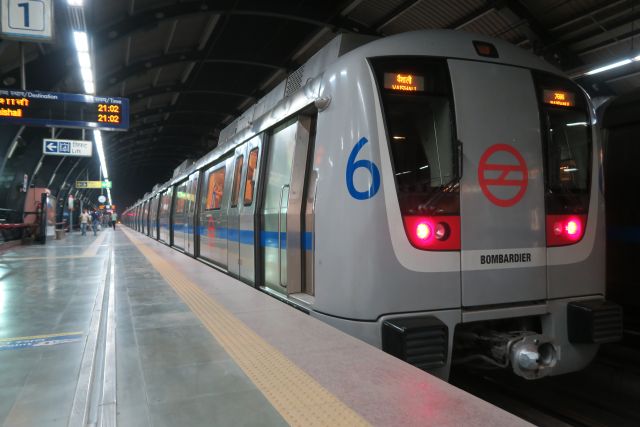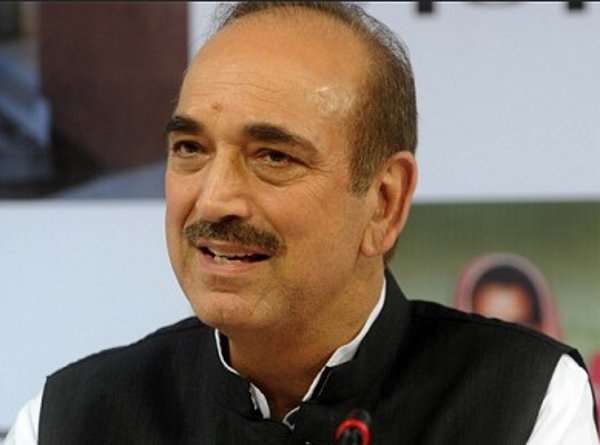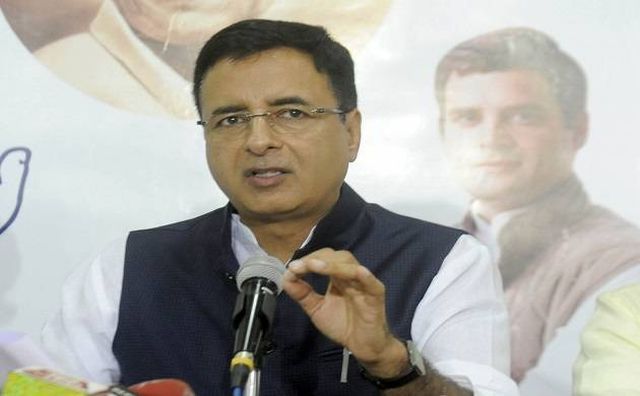
by Editor | May 25, 2021 | Corporate, Corporate Governance, Economy, Markets, News, Politics
 New Delhi : Delhi’s ruling AAP on Wednesday blamed the Modi government for the Delhi Metro fare hike and said it was meant to defame the city government.
New Delhi : Delhi’s ruling AAP on Wednesday blamed the Modi government for the Delhi Metro fare hike and said it was meant to defame the city government.
Addressing the media here, Aam Aadmi Party MLAs Pankaj Gupta and Nitin Tyagi said it was a shame that Delhi Metro had now gone beyond the reach of the ‘Aam Aadmi’ (common people) due to its exorbitant fares.
“Price hike in Delhi Metro is a well-planned stunt of the BJP-led Central government to defame AAP, which has been consistently opposing the fare hike,” Tyagi said.
Gupta said the BJP did not bother about the price hike despite several protests. The fare hike, Tyagi said, had made Delhi Metro the world’s second most expensive metro network.
The Metro lost over 40 per cent of its ridership following two fare hikes in 2017.
—IANS

by Editor | May 25, 2021 | News, Politics
 Hamburg (Germany) : Congress President Rahul Gandhi on Wednesday made a strong attack on the Narendra Modi government by referring to incidents of lynching and attacks on Dalits, saying people in India were angry and the ruling alliance was weakening support structures meant for the weaker sections.
Hamburg (Germany) : Congress President Rahul Gandhi on Wednesday made a strong attack on the Narendra Modi government by referring to incidents of lynching and attacks on Dalits, saying people in India were angry and the ruling alliance was weakening support structures meant for the weaker sections.
Speaking at the Bucerius Summer School here in Germany, Gandhi also attacked Prime Minister Narendra Modi over attacks on women, “lack of jobs,” demonetisation and “flawed” implementation of the Goods and Services Tax and said corporates were being favoured over the rights of the marginalised communities.
Gandhi, who later took questions from the audience, also referred to his hugging the prime minister during the debate in parliament on the no-confidence motion, saying certain “hateful remarks” made against him by Modi prompted him to do so but “he (Modi) didn’t like and was upset by it”.
Gandhi is in Germany as part of reach out to the NRI community ahead of next year’s Lok Sabha elections. He will also go to the United Kingdom.
The Congress leader accused Modi government of not being keen on benefiting all sections from transformation taking place due to urbanisation.
“They do not feel that every single person in India should have access to fruits of transformation. They feel that tribal communities, poor farmers, Dalit, should not get the same benefits as the elite of the country gets. We feel everybody took the risk, everybody should get the reward,” Gandhi said.
“The other thing they have done is they have started attacking the support structures that were designed to help certain groups of people,” he added.
Gandhi said welfare measures of UPA government such as the right to food and the right to guaranteed employment had been weakened and money going into these schemes “is going into the hands of very few people, the largest corporates in the country.”
Gandhi alleged that demonetisation carried out by Modi had taken away lakhs of jobs as it had destroyed cash flow of small and medium businesses.
“China produces 50,000 jobs every 24 hours, India only 450,” Gandhi said, adding that bad implementation of GST had let to closure of thousands of businesses.
“These things are what has made people in India angry. That is what you get to read in the newspaper. When you hear about lynchings in India, when you hear about attacks on Dalits in India, when you hear about attacks on minorities in India, that is the reason for it,” Gandhi said.
He said the transition that is shaping the world requires certain protection for people. “That protection is being taken away and India is reacting to that. It is very dangerous in 21st century to exclude people. If you do not give people a vision in the 21st century, somebody else will which is not going to be good. That is the real risk of excluding large number of people from our development processes,” he said.
Gandhi said hate is a dangerous thing in a connected world and it is a choice. “I can fight you, take you on. I can compete with you but hating you is something I have to actively chose to do.”
Gandhi said his main complaint with Modi is that India has jobs problem but he does not say it and asked how it will be fixed if it is not even acknowledged.
Gandhi said level of violence is increasing in India and “women were getting a huge share of it.” He called for a change in the attitude of Indian men at the way they treated women.
He said non-violence in India was a foundational philosophy of India’s nationhood and noted violence can only be fought by non-violence.
Referring to assassinations of his grandmother Indira Gandhi and his father Rajiv Gandhi, he said the only way to move forward after violence is forgiveness.
Answering a question on the US and China, Gandhi said India’s role will be to balance like that of Europe.
He said India’s actions will be guided by self-interest and noted that it is closer to the US than to China.
Referring to Modi coming to power in India and “certain style” of leaders coming to power in the US and some European countries, he said the reason was failure of jobs, particularly to non-white collar persons.
“We are outcompeted by Chinese. That is creating a lot of anger,” he said.
He also said India was not in a race with China but was wanted to develop according to its values.
—IANS

by Editor | May 25, 2021 | News, Politics

Ghulam Nabi Azad
New Delhi : In an apparent dig at the Narendra Modi government, senior Congress leader Ghulam Nabi Azad on Monday said there was “no distance, as it is today” between the government and the opposition in Vajpayee’s era.
Paying tributes to former Prime Minister Atal Behari Vajpayee at a prayer meeting here, Azad recalled how as the Union Parliamentary Affairs Minister in Narasimha Rao government, he would frequently meet Vajpayee – who was the Leader of Opposition then – and share food and drinks with him.
“As the Parliamentary Affairs Minister between 1991 and 1996, I used to meet Atalji very frequently as he was the Leader of Opposition then. Three-four meetings between a Parliamentary Affairs Minister and Leader of Opposition are quite common. Since we were a minority government, it was natural to be dependent on the opposition,” Azad said.
“We would often eat together, sometimes in my chamber and at other times in his chamber (during Parliament session). There were no distances, no aloofness, unlike these days between the government and the opposition,” Azad said.
He said that Vajpayee was dedicated to the welfare and progress of the nation and its people.
—IANS

by Editor | May 25, 2021 | Corporate, Corporate Governance, News, Politics
 New Delhi : The Congress on Friday said that “complicity and connivance” of the government in the escape of jeweller Mehul Choksi, an accused in the PNB fraud, has been “exposed” after the Antigua government came clear on granting citizenship to Choksi.
New Delhi : The Congress on Friday said that “complicity and connivance” of the government in the escape of jeweller Mehul Choksi, an accused in the PNB fraud, has been “exposed” after the Antigua government came clear on granting citizenship to Choksi.
The party also demanded to know why Prime Minister Narendra Modi had not raised Choksi’s citizenship during a meeting with his Antiguan counterpart Gaston Browne in April this year.
“A press statement by the Citizenship by Investment Unit (CIU) of Antigua Barbuda reveals how the Ministry of External Affairs and agencies like SEBI (Securities and Exchange Board of India), Enforcement Directorate and CBI gave Choksi a clean chit,” Congress Spokesman Randeep Singh Surjewala said.
Choksi had applied for Antiguan citizenship and got it in November 2017. He left India on January 4 this year.
“A complaint dated May 7, 2015 was filed with the Ministry of Corporate Affairs by one Vaibhav Khuraniya and R.M. Green Solution Pvt Ltd. A copy was also sent to the Prime Minister’s Office, ED and Serious Fraud Investigation Office. A similar complaint was filed to Deputy Commissioner of Police, Mumbai,” Surjewala said.
“Another person named Digvijaysinh Jadeja lodged an FIR in Ahmedabad Economic Offences Wing, Gujarat, against Mehul Choksi and others for fleecing him. The matter went to Gujarat High Court, where the state government was a party. In a special criminal application, Jadeja filed an affidavit on July 20, 2016 specifically pointing out that Choksi and others owed Rs 9,872 crore to banks and are likely to escape from India,” he added.
He said a complaint dated July 26, 2016 was filed by one Hariprasad to PMO. On May 3, 2017, one Vaibhav Khuraniya also emailed the complaint to SEBI.
“Why did the MEA provide clean chit to Choksi in May 2017 despite the complaints and evidence being available two years earlier, that is, May 7, 2015, July 20, 2016 and May 3, 2017,” Surjewala asked.
“Why did the PMO not act despite the complaint dated May 7, 2015 and direct any investigating agency to take action? Does it not put a question mark on the role of the PMO?” he asked.
—IANS

by Editor | May 25, 2021 | News, Politics
 By Shreehari Paliath,
By Shreehari Paliath,
Mumbai : The Bharatiya Janata Party (BJP), or a political alliance it is a part of, governs 18 of 29 states in India, home to nearly 63% of the countrys population. But only one BJP-ruled state, Himachal Pradesh, made it to the list of five best-governed states in India, according to a new study.
The public affairs index (PAI) 2018, developed by Public Affairs Centre (PAC), a Bengaluru-based think tank, evaluated state governance using 10 broad themes, 30 focus subjects, and 100 indicators, according to its website. These include law and order, economic freedom, environment, transparency and so on. This is the third edition of the index.
The top five states in the order of their ranking are Kerala, Tamil Nadu, Telangana, Himachal Pradesh and Karnataka. Of these, Kerala is governed by the Communist Party of India (Marxist)-led Left Democratic Front, Tamil Nadu by the All India Anna Dravida Munnetra Kazhagam (AIADMK), Telangana by the Telangana Rashtra Samiti (TRS) and Karnataka by a Janata Dal (Secular)-Congress combine.
The top 10 list includes all the southern states — none of which are governed by the BJP. Four states in this list are governed by the BJP and two by its chief opponent, the Congress (singly or in a coalition). Andhra Pradesh, ruled by the Telugu Desam Party, was placed ninth.
These ranks are significant because BJP came to power on the promise of delivering development through its sabka saath, sabka vikas (development for all) campaign.
“The election manifesto, which revolves around the core issues of good governance and development, discusses in detail the party’s focus at tackling the concerns of price rise, corruption, black money and policy paralysis,” noted the prime minister’s website, narendramodi.in, the day his party’s election manifesto was released on April 7, 2014.
The PAI index has ranked 30 states, including Delhi. The aggregated rankings of the the top two states — Kerala and Tamil Nadu — have remained the same over three years.
“These [southern] states have been doing well historically,” Narayana A, faculty on governance at Azim Premji University, told IndiaSpend. “It may not be the presence or absence of the BJP that matters so much. The nature of politics may be a factor like the mobilisation of other backward classes and scheduled castes states like Kerala and Tamil Nadu.”
Himachal Pradesh topped the list of small states with population less than 20 million. Of the 12 small states that made it to the list, BJP heads, or is a part of, the government in eight. Goa and Tripura made it to the top five. The non-BJP exception is the Congress-led government in Mizoram, placed third after Goa and Sikkim.
Among the 18 large states (with population over 20 million), the top four were south Indian states, followed by BJP-governed Gujarat and Maharashtra. Bihar languished at the bottom in the list of large states and the overall aggregated ranking.
Jharkhand, Madhya Pradesh and Uttar Pradesh were the other states at the bottom of the PAI index for large states. All the bottom four large states are BJP-governed.
BJP-governed states, led by Gujarat, have most economic freedom. “The theme of economic freedom explores the effort undertaken by the state governments to improve business environment in the state,” the report said.
Maharashtra was ranked second in economic freedom. Telangana, placed third before Himachal Pradesh and Haryana, was the only state without a BJP government in this category. Bihar was ranked last among the large states on this aspect.
“BJP has come to symbolise the economic and political right. They want to present the party as one which promotes business which makes it easy for investments to come in,” said Narayana.
The southern states may not do as well as Gujarat in ease of doing or promoting business but Tamil Nadu and Karnataka have done well in attracting foreign direct investment, Narayana pointed out. States like Jharkhand and Madhya Pradesh just provide land or speedy clearances but that makes for only “selective good governance”, he said.
Tamil Nadu, Kerala and Maharashtra (in that order) have the best record in managing crime and maintaining law and order among the large states. Haryana and Jharkhand rank the last in this list. The top five safest states feature two BJP-ruled states, including Gujarat, and three governed by others including West Bengal.
This theme explored violence, atrocities, and policing including indicators such as rapes, murder, dowry deaths per 100,000 population among other factors.
“It is interesting to point out that despite Kerala having a very high number of FIRs, in the matter of their disposal and conviction rate have performed well,” the report noted.
Nagaland and Goa were the best amongst small states while Delhi and Tripura were at the bottom in this list, for the last three years. Nagaland was the best performing as per the aggregated ranking of 30 states.
Delhi, governed by the Aam Aadmi Party, is placed last in the list on two counts — environment, and transparency and accountability.
Karnataka emerged as the best in the category among large states while Arunachal Pradesh was placed on top amongst small states. Gujarat fell seven notches from last three years to 10 and Telangana which has improved its position from 17 last year to 7 this year,” the report noted.
Karnataka and Haryana were the top two states on the transparency scale. Kerala fell eight places to 11th among the large states in this respect between 2017 and 2018. But Telangana’s ranking improved seven spots to 4th during the same period.
(In arrangement with IndiaSpend.org, a data-driven, non-profit, public interest journalism platform, with whom Shreehari Paliath is an analyst. The views expressed are those of IndiaSpend. Feedback at respond@indiaspend.org)
—IndiaSpend/IANS

 New Delhi : Delhi’s ruling AAP on Wednesday blamed the Modi government for the Delhi Metro fare hike and said it was meant to defame the city government.
New Delhi : Delhi’s ruling AAP on Wednesday blamed the Modi government for the Delhi Metro fare hike and said it was meant to defame the city government.



